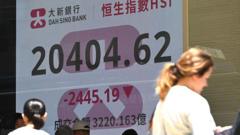**Asian economies faced a significant downturn as tariffs imposed by the US President Donald Trump trigger fears of a global trade war. Major stock markets saw declines reminiscent of past crises, leading to widespread anxiety regarding future economic growth.**
**Asian Markets Plunge Amid Trump Tariffs: The Worst Decline in Decades**

**Asian Markets Plunge Amid Trump Tariffs: The Worst Decline in Decades**
**Investors Brace for Economic Slowdown Following Major Dropped Markets Across Asia**
Asian stocks experienced historical declines on Monday, marking the worst drops in decades as global markets reacted to tariffs imposed by US President Donald Trump. Indices across the region, including the Shanghai Composite, Hong Kong's Hang Seng, and Japan's Nikkei 225, faced staggering losses, shaking investor confidence.
The Shanghai Composite plummeted by over 8%, while the Hang Seng tumbled more than 13% — figures that analysts described as a "bloodbath." Japan's Nikkei 225 closed down by 7.8%, as European markets mirrored these tumultuous trends with financial institutions and defense firms taking the hardest hits.
This downturn follows Trump's recent announcement of new tariffs between 10% and 46%, significantly impacting Asia's manufacturing sectors reliant on the US market for exports. Countries like Japan and South Korea are poised to face tariffs as high as 26%, while rapidly growing economies like Vietnam brace for a staggering 46% levy, prompting swift economic concerns.
Economists warn that Asia is particularly vulnerable to a potential global economic slowdown or recession resulting from the US's actions. As investors absorbed these developments, China's mainland, along with Hong Kong and Taiwan, saw record falls in their markets, with Taiwan’s Weighted Index suffering a historic 9.7% drop.
While Australia’s ASX 200 fell by 4.2%, South Korea’s Kospi lost 5.6%. The Hang Seng's dramatic decline marks its largest drop since the 2008 financial crisis. Economic analysts underscore that rising tariffs have ignited inflation concerns, further complicating the outlook.
Goldman Sachs has heightened its estimate for the probability of a US recession to 45%, with JPMorgan projecting a 60% risk, signaling widespread anxiety surrounding the economic impacts of these tariffs. This tumultuous landscape disproportionately affects smaller Asia-Pacific economies heavily dependent on the US for exports. Bangladesh, for instance, faces dire consequences from a new 37% tariff on its garments, highlighting the depth of potential ramifications.
Frank Lavin, a former US commerce official, noted that the scale of exports sent from Asia to the US exceeds that of any other market, making the region especially susceptible to these economic shocks. Adding to the instability, China retaliated with its own tariffs following Trump's measures, compounding the existing turmoil in global markets.
As the situation unfolds, financial analysts predict a continued rout in stock valuations worldwide. US futures indicate more declines ahead, hinting that Wall Street is bracing for another arduous trading day. Trillions in global market value have evaporated since the introduction of Trump's import taxes, leaving uncertainty and anxiety in their wake.
The Shanghai Composite plummeted by over 8%, while the Hang Seng tumbled more than 13% — figures that analysts described as a "bloodbath." Japan's Nikkei 225 closed down by 7.8%, as European markets mirrored these tumultuous trends with financial institutions and defense firms taking the hardest hits.
This downturn follows Trump's recent announcement of new tariffs between 10% and 46%, significantly impacting Asia's manufacturing sectors reliant on the US market for exports. Countries like Japan and South Korea are poised to face tariffs as high as 26%, while rapidly growing economies like Vietnam brace for a staggering 46% levy, prompting swift economic concerns.
Economists warn that Asia is particularly vulnerable to a potential global economic slowdown or recession resulting from the US's actions. As investors absorbed these developments, China's mainland, along with Hong Kong and Taiwan, saw record falls in their markets, with Taiwan’s Weighted Index suffering a historic 9.7% drop.
While Australia’s ASX 200 fell by 4.2%, South Korea’s Kospi lost 5.6%. The Hang Seng's dramatic decline marks its largest drop since the 2008 financial crisis. Economic analysts underscore that rising tariffs have ignited inflation concerns, further complicating the outlook.
Goldman Sachs has heightened its estimate for the probability of a US recession to 45%, with JPMorgan projecting a 60% risk, signaling widespread anxiety surrounding the economic impacts of these tariffs. This tumultuous landscape disproportionately affects smaller Asia-Pacific economies heavily dependent on the US for exports. Bangladesh, for instance, faces dire consequences from a new 37% tariff on its garments, highlighting the depth of potential ramifications.
Frank Lavin, a former US commerce official, noted that the scale of exports sent from Asia to the US exceeds that of any other market, making the region especially susceptible to these economic shocks. Adding to the instability, China retaliated with its own tariffs following Trump's measures, compounding the existing turmoil in global markets.
As the situation unfolds, financial analysts predict a continued rout in stock valuations worldwide. US futures indicate more declines ahead, hinting that Wall Street is bracing for another arduous trading day. Trillions in global market value have evaporated since the introduction of Trump's import taxes, leaving uncertainty and anxiety in their wake.




















